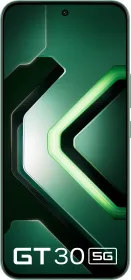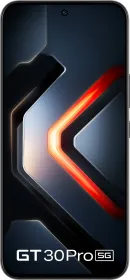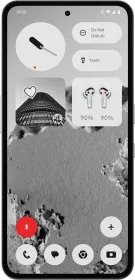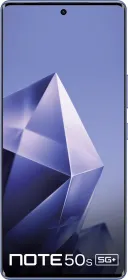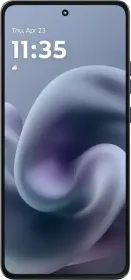The Infinix GT 30 5G is making waves as a budget gaming smartphone that’s designed to appeal to the growing crowd of mobile gamers in India. With its focus on performance, unique gaming features, and a price tag under ₹18,000, it’s positioning itself as a strong contender in a segment dominated by brands like iQOO, POCO, CMF, and realme.
Infinix has clearly put effort into differentiating this device, like the customizable LED lights, dedicated gaming triggers, and also a robust cooling system, all while not skimping on everyday usability.
At the heart of the GT 30 5G is the MediaTek Dimensity 7400 chipset, which delivers decent performance. It’s paired with a 144 Hz AMOLED display, a 5,500 mAh battery, 45W fast charging, and a camera setup led by a 64MP Sony sensor. There are also AI features, yes, powered by Infinix’s own suite, and the phone runs on the latest Android 15 with XOS 15 overlay.
On paper, this looks like a winner for gamers on a budget, but how does it hold up in real-world testing? I’ve put the GT 30 5G through its paces to see if it lives up to the hype. Let’s dive deep into what makes this phone tick.
Infinix GT 30 5G Price & Availability
The Infinix GT 30 5G is available in three color options: Cyber Blue, Pulse Green, and Blade White. It comes in two RAM and storage variants: 8GB + 128GB and 8GB + 256GB. You can purchase it via Flipkart, the Infinix official store, and select retail outlets. Pricing starts at:
- 8GB + 128GB: ₹19,499
- 8GB + 256GB: ₹20,999
For a limited time, there’s a ₹1,500 discount available with ICICI Bank cards, bringing the effective starting price down to ₹17,999 on launch day sales.
Pros
- Dimensity 7400 SoC is actually fine
- Good battery life
- 144 Hz AMOLED display with 1600 HBM
- GT Gaming Triggers are useful
- IP64 dust and water resistance
- XOS 15 with useful AI features
- 45W fast charging & 10W reverse charging
- Solid haptics
- IR blaster
- Stereo speakers sound good
Cons
- Camera lacks OIS, leading to blurry shots
- Limited to two years of major OS updates
- Ultra-wide camera is below average at best
- Camera app gets slow at times
Infinix GT 30 5G Specifications
- Display: 6.78-inch AMOLED, Flat, 144 Hz, 4500 Nits peak (HDR), 1600 Nits HBM, 1.5K (1224 x 2720), 440 PPI, 2304 Hz PWM Dimming, Corning Gorilla Glass 7i
- SoC: MediaTek Dimensity 7400 (4nm), Octa-core (up to 2.6GHz)
- RAM: 8GB LPDDR5X
- Storage: 128GB / 256GB UFS 2.2
- Cameras:
- Main: 64MP Sony IMX682 1/1.7-inch, f/1.75, 23mm, AF, no OIS, 4K30
- Ultra-wide: 8MP GalaxyCore GC08A8 1/4-inch, f/2.2, 14mm, AF, 1080p30
- Front Camera: 13MP GalaxyCore GC13AOFF 1/3.06-inch, f/2.2, 24mm, FF, 4K30
- Speakers: Stereo with DTS support
- Battery and Charging: 5,500 mAh, 45W Fast Charging, 10W Reverse Charging
- IP Rating: IP64
- Connectivity: 5G (10 bands), Wi-Fi 6, Bluetooth 5.4, USB-C 2.0, IR Blaster
- Biometrics: In-display optical fingerprint, 2D face unlock
- Weight and Dimensions: 187g / 7.99mm thickness
- Build: Plastic back and frame, flat display with pre-installed screen protector
Infinix GT 30 5G Review: Design and Build

The Infinix GT 30 5G stands out immediately with its Cyber Mecha 2.0 design, which Infinix describes as inspired by sci-fi and gaming aesthetics. The polycarbonate back is glossy and attracts fingerprints, and the frame is also plastic.
At 188 grams and 7.99mm thick, it’s balanced, as in it’s not too heavy for extended gaming but substantial enough to feel durable. The phone comes in some nice colors like Cyber Blue and Pulse Green, which feature geometric patterns that catch the light, adding a futuristic look.

A highlight is the customizable white LED lighting on the back, which lights up for notifications, calls, charging, or even in sync with music and games. You can tweak the patterns via the settings, making it a fun personalization tool for gamers.
The GT Gaming Triggers are another standout: these are capacitive shoulder buttons on the top and bottom edges (when held in landscape). They’re responsive and can be mapped to in-game actions, launching apps, or even controlling media playback, like double-pressing to play/pause videos or single-pressing to snap photos in the camera app.


Durability is fine with an IP64 rating for dust and splash resistance. There’s Corning Gorilla Glass 7i on the front, and a pre-installed screen protector (although the alignment is poor, at least on my unit). The flat display makes applying tempered glass easy, though.

Port layout is standard: USB-C at the bottom alongside the SIM tray (dual nano-SIM, no microSD), speaker grille, and microphone. The right side has the power button, volume rocker, and GT triggers, while the left is clean. Top has the IR blaster, secondary speaker, and mic.

Overall, the design is gamer-centric but practical for daily use as well. I like it.
Infinix GT 30 5G Review: Display

The display is one of the GT 30 5G’s strongest suits. It’s a 6.78-inch AMOLED panel with 1.5K resolution (1224 x 2720), delivering sharp visuals at 440 PPI. The 144 Hz refresh rate ensures buttery-smooth scrolling and animations, though most apps default to 120Hz, and gaming titles like BGMI cap at 90FPS (more on that later). You can force high refresh in settings, and it supports adaptive rates down to 60Hz for battery savings.
Brightness peaks at 4500 Nits for HDR content, 1600 Nits in high brightness mode (HBM), and 700 Nits typical, which is plenty for outdoor use, even in bright sunlight. Colors are also vibrant, and you get 100% DCI-P3 coverage and 10-bit depth. PWM dimming at 2304 Hz reduces eye strain, something that’s often overlooked by many smartphones.

The punch-hole notch houses the front camera and is unobtrusive. Bezels are kinda thick with a slight chin, but not something strange for this price. Watching content is enjoyable, with good contrast and no major issues. For the price, this is among the best displays in the sub-₹20,000 segment.
Infinix GT 30 5G Review: Speakers and Haptics

Audio on the GT 30 5G comes from stereo speakers with DTS tuning, delivering loud, clear sound suitable for gaming and media. Bass is really good for the price. Infinix uses two dedicated speakers, unlike others who use the earpiece. At max, there’s some vibration from the back panel. The earpiece is also good. Calls are clear, with no issues with volume or clarity.
Haptics are a pleasant surprise, thanks to the X-Axis linear motor. Feedback is sharp and tactile, better than most in this segment. It’s not as refined as flagship devices, but for typing, notifications, and in-game vibrations, it’s really good. Infinix needs to work on the haptic integration across the UI, though.
Infinix GT 30 5G Review: Software

The GT 30 5G runs on Android 15 with XOS 15, offering a nearly-clean, feature-rich experience that’s improved over previous Infinix skins. Animations are fluid (although there is no blur), with full system-wide transitions that feel smooth for this price. Infinix commits to two major OS updates and three years of security patches, which is decent but not class-leading (competitors like Samsung offer more).

XOS 15 is customizable with themes, a modern control center, and features like Dynamic Bar (similar to Dynamic Island for notifications), split-screen multitasking, floating windows, and Smart Panel for quick access. Bloatware exists, but it’s very minimal—only 33 pre-installed apps, which include Infinix’s own apps and Google’s suite of apps.

AI is a big focus with Infinix AI suite: AI Eraser for removing objects from photos, AI Cutout for stickers, AI Extender for expanding images, AI Summary for articles (which works in Chrome too), AI Translate for messaging apps, AI Notes for generating images using a sketch (doesn’t work well most of the time), and AI Auto-Answer, Call Summary, and Real-Time Call Translator for help with calls.

You’ve also got the Folax voice and the Folax Smart Touch, which helps you extract content from the screen. There’s also the Smart Hub, where you can save content in the sidebar. You’ve also got Circle to Search, Google Gemini, and AI Wallpaper Generator. If you’re planning to buy this phone, you can simply go to the Settings > Infinix AI and have a look at all the AI features available.

Gaming-specific software includes X-Boost mode for optimization, Esports Mode for low latency, Network Acceleration, and Zone Touch Master (AI-tuned touch response). You can access Infinix AI via the GT Trigger. Drawbacks include occasional jitters in heavy multitasking, no advanced blur effects when opening or closing apps, and no proper seamless transition from the lock screen to the AOD. Overall, XOS 15 is smooth and underrated.
Infinix GT 30 5G Review: Biometrics

Biometrics are reliable with an in-display optical fingerprint scanner that’s fast and accurate, even if placed a bit low (common in mid-rangers). It unlocks in under a second with good success rates. 2D face unlock is quick in well-lit conditions but less secure and inconsistent in low light; use it as a secondary option only.
Infinix GT 30 5G Review: Performance

The Dimensity 7400 powers the GT 30 5G, with 8GB LPDDR5X RAM and UFS 2.2 storage. It’s not the fastest in class, but it handles daily tasks smoothly. You’ll notice no lag in browsing, social media, or even light editing. RAM management is efficient, keeping apps in memory well.
Synthetic Benchmarks
The Dimensity 7400 isn’t the best chip for this price. The Snapdragon 6 Gen 4 definitely performs better, even though it’s not by a huge margin. The Infinix GT 30, however, delivers acceptable performance. Here are some benchmarks.

| Benchmark | Dimensity 7400 (Infinix GT 30 5G) | Snapdragon 6 Gen 4 (OPPO K13) | Dimensity 7400 (Motorola Edge 60 Fusion) |
| AnTuTu Score | 694,663 | 711,176 | 682,953 |
| Storage (Score, Sequential Read Speed, Write Speed) | 53,209 (Score), 1054 MB/s (Read), 788 MB/s (Write) | 93,365 (Score), 1912 MB/s (Read), 1005 MB/s (Write) | 57,878 (Score), 866 MB/s (Read), 849 MB/s (Write) |
| Geekbench 6 CPU (Single-Core, Multi-Core) | 1058 (Single-Core), 3155 (Multi-Core) | 986 (Single-Core), 2873 (Multi-Core) | 1045 (Single-Core), 3013 (Multi-Core) |
| Geekbench 6 GPU (OpenCL, Vulkan) | 3081 (OpenCL), 3070 (Vulkan) | 2933 (OpenCL), 3953 (Vulkan) | 3149 (OpenCL), 3109 (Vulkan) |
| 3DMark Wildlife Extreme (Score, Avg FPS) | 1048 (Score), 6.28 (Avg FPS) | 952 (Score), 5.71 (Avg FPS) | 1023 (Score), 6.13 (Avg FPS) |
| 3DMark Wildlife Extreme Stress Test (Best Loop, Lowest Loop, Stability) | 1046 (Best Loop), 1040 (Lowet Loop), 99.4% (Stability) | 965 (Best Loop), 951 (Lowet Loop), 98.6% (Stability) | 1019 (Best Loop), 1001 (Lowest Loop), 98.2% (Stability) |
Gaming

Gaming is where this phone truly shines. Certified for 90 FPS in BGMI (Smooth & Extreme+), it consistently delivers stable 90 FPS gameplay without overheating. The 5,400 mm² cooling system is clearly effective. COD Mobile also runs smoothly at 90 FPS.
Genshin Impact can give you an average of 39-42 FPS, which is pretty good for a phone that costs less than ₹20,000. It doesn’t even get hot playing Genshin, even after 30 minutes of gameplay.
The GT Triggers are actually very useful, and you can map them for different actions in games like BGMI, COD, and Genshin Impact too. Features like Bypass Charging (powers device directly, bypassing battery heat) and AI HyperBoost keep sessions cool and lag-free.
As for connectivity, the GT 30 features 10 5G bands, Wi-Fi 6, and Bluetooth 5.4. UltraLink (Bluetooth relay for calls without a network) works, but only with other Infinix devices. For ₹19,000, the performance is definitely not bad. In fact, in actual usage, it is really good.
Infinix GT 30 5G Review: Cameras

The camera setup is serviceable but not flagship-level. The 64MP Sony IMX682 main sensor (f/1.85, no OIS) captures detailed daylight shots with good colors and HDR. Details hold up at 2X digital zoom, but beyond that, sharpening artifacts appear. The 8MP ultrawide adds versatility for landscapes, though colors are muted and details are softer.









Low-light performance is average. Super Night mode brightens shots but introduces a lot of blur, due to the lack of OIS. Portraits have decent edge detection at 1X/2X, with natural skin tones.



Macro uses the ultrawide for close-ups (up to 10cm), but you can get better results by simply using the 2X crop from the main sensor.




As for video, you can shoot 4K30 with EIS and 1080p60/1080p30 using the rear camera. The ultra-wide, being an 8MP unit, tops at 1080p30. Surprisingly, the 13MP front camera can shoot 4K30 and 1080p60/30, making it good for vlogs (unlike some other phones with 4K video in this segment).
It features Pro mode (ISO, shutter, WB, etc), video filters (cinematic frames like 35mm film), Dual Video, Time-Lapse, and Slow Motion. You’ve also got portrait video on both the front and the rear cameras, where you can record in 1080p30. The videos come out fine, actually.
All in all, the Infinix GT 30’s cameras are fine for casual use, but lack OIS for shaky hands or low-light videos.
Infinix GT 30 5G Review: Battery Life and Charging

The 5,500 mAh battery performs well, delivering 6.5-7 hours SOT with heavy use or 10 hours moderate. If you are playing BGMI, the battery lasts about 5 hours. The phone can go from 0-100% in about 58 minutes, using the included 45W charger.
During charging, you can switch between Smart, Hyper, and Low-Temp modes on the lock screen, which is a neat addition. The phone also supports 10W reverse charging, which is handy for charging other devices.
Review Verdict: Should You Buy the Infinix GT 30 5G?
At ₹19,499 (or ₹17,999 with offers), the Infinix GT 30 5G is a compelling budget gamer. It provides decent performance with Dimensity 7400, cooling, and triggers, while the display, battery, and AI features are also good. Software is polished, though updates could be longer. Cameras are the weak link, average without OIS, but sufficient for most.
If you are looking for options with stronger performance and can compromise on other aspects, you can consider the OPPO K13 (review), which is also a very good choice. The CMF Phone 2 Pro (review) is a decent pick if you want zoom and the Nothing OS experience. Otherwise, the Infinix GT 30 is also a good purchase at ₹17,999. Just remember that UFS 2.2 might begin to show its age soon.

Smartprix ⭐ Rating: 8.5/10
- Design and Build: 8.8/10
- Display: 9/10
- Speakers: 8/10
- Software: 8.7/10
- Haptics: 8.5/10
- Biometrics: 9/10
- Performance: 8.7/10
- Cameras: 7/10
- Battery Life & Charging: 9/10
First reviewed in August 2025.















